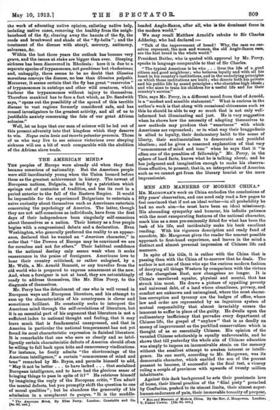THE AMERICAN MIND.*
THE peoples of Europe were already old when they first became conscious of nationality. But the American people were still inordinately young when the -Union loomed before them as the greatest achievement in history. The newest of European nations, Bulgaria, is fired by a patriotism which springs out of centuries of tradition, and has its root in a period anterior to the fall of the Eastern Empire. It would be impossible for the experienced Bulgarians to entertain a naïve curiosity about themselves such as Americans entertain concerning the psychology of America. The latter, though they are not self-conscious as individuals, have from the first days of their independence been singularly self-conscious about themselves as a nation. Their history as a free people begins with a congressional debate and a declaration. Even Washington, who generally preferred the reality to an appear- ance, declared that be wanted an "American character," in order that " the Powers of Europe may be convinced we are for ourselves and not for others." Their habitual confidence in the national destiny only seems weak when it seeks reassurance in the praise of foreigners. Americans love to hear their country criticised, or rather eulogised, by a Mr. Wells, a Mr. Arnold Bennett, or any traveller from the old world who is prepared to express amazement at the new. And, when a foreigner is not at band, they are astonishingly ready to address themselves, like Mr. Bliss Perry, to the diagnosis of themselves.
Mr. Perry has the detachment of one who is well versed in European ways and European literature, and his attempt to sum up the characteristics of his countrymen is clever and sometimes brilliant. He constantly seeks to interpret the American mind through the self-revelations of literature, but it is an essential part of his argument that literature is not a sufficient index to national thought and feeling, that it may leave much that is fundamental unexpressed, and that in America in particular the national temperament has not yet found its most characteristic expression in finished literature. It is remarkable that one who sees so clearly and so intel- ligently certain characteristic defects of America should often be willing to fall back upon trite and unnecessary vindications. For instance, he freely admits " the shortcomings of the American intelligence," a certain "commonness of mind and tone" remarked by Mr. Bryce, and permits himself to add, "May it not be better . . . to have lacked . . . that socialized European intelligence, and to have had the glorious sense of bringing things to pass in spite of it? " He retrieves himself by imagining the reply of the European critic, " You admit the mental defects, but you promptly shift the question to one of moral qualities "; but he abandons the generosity of his admission in a complacent to quoque, " It is the muddle- • The American Mind. By Bliss Perry. London: Constable and Co. [43. 6d. net.] headed Anglo-Saxon, after all, who is the dominant force in the modern world."
We may recall Matthew Arnold's rebuke to Sir Charles Adderley, who had declared :—
"Talk of the improvement of breed ! Why, the race we our- selves represent, the men and women, the old Anglo-Saxon race, are the best breed in the whole world."
President Butler, who is quoted with approval by Mr. Perry, speaks in language comparable to that of Sir Charles.
" The typical American is he who . . . lives the life of a good citizen and good neighbour; who believes loyally and with all his heart in his country's institutions, and in the underlying principles on which those institutions are built ; who directs both his private and his public life by sound principles ; who cherishes high ideals ; and who aims to train his children for a useful life and for their country's service."
This, says Mr. Perry, in a different mood from that of Arnold, is a "modest and sensible statement." What is curious in the author's work is that along with occasional obtuseness such as this he should be able to say so much that is not only well-
informed but illuminating and just. He is very suggestive when he shows how the necessity of adapting themselves to new methods may produce that "smartness" with which Americans are reproached; or in what way their braggadocio is allied to loyalty, their declamatory habit to the sense of liberty, their sentimentalism to democratic and youthful idealism ; and he gives a reasoned explanation of that very "commonness of mind and tone" when he says that it "is often one of the penalties of fellowship." Mr. Perry, in the sphere of hard facts, knows what he is talking about; and be has judgment and imagination enough to make his observa- tions effective, to present, that is, an interpretation of America such as we cannot get from the literary tourist or the mere impressionist.










































 Previous page
Previous page